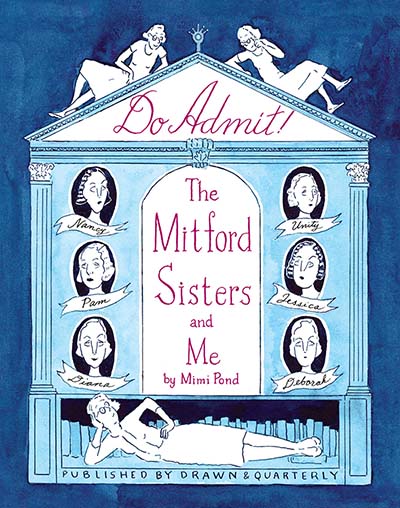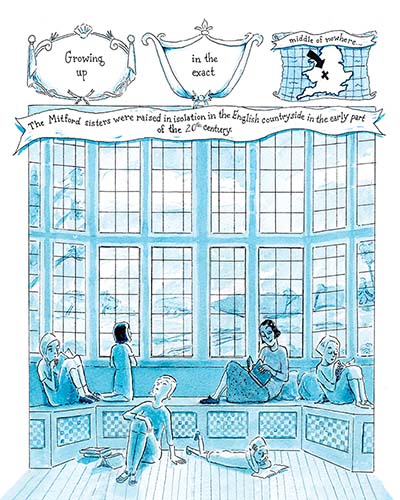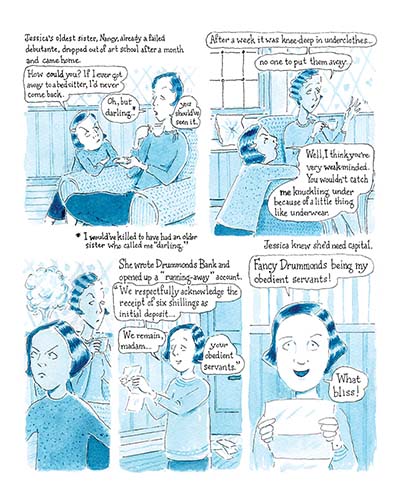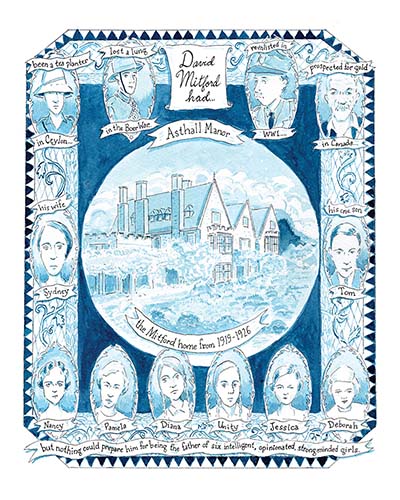It’s hard to try and paraphrase how colourful (a term that doesn’t do justice) the lives of the Mitford sisters were. Daughters of British aristocrats David Freeman-Mitford and Sydney Bowles, it wouldn’t be a stretch to call these six wealthy women—Diana, Jessica, Unity, Nancy, Deborah, and Pamela—the Kardashians of their time, albeit with marginally lower levels of fame and influence. They certainly prompted their fair share of gossip in a world that had yet to invent social media, while making a series of questionable decisions that could be blamed on anything from privilege to bad company.
It’s also hard to see why Mimi Pond would gravitate to this family as the subject for the memoir Do Admit: The Mitford Sisters and Me, given how far removed her own life is from theirs. But then she explains, and one remembers that this an artist with a propensity to find humour in odd places, and it all starts to make sense.
The sisters have reportedly been a private obsession of Pond’s for a long time, which shows in the level of detail that has gone into unravelling the various threads of their individual stories. What stands out almost immediately is her use of blue ink, along with the attention to detail that faithfully recreates various periods in which these mini biographies are set. There are intricate sketches of movie theatres and apartments, city skylines, even vintage advertisements. And running through it all is our omniscient narrator, describing why these wild and wealthy women captured her imagination.
When it comes to fiction, there has been a long-established tradition of using the lives of individuals to illuminate larger events, to help one come to terms with the sweep of history that can only be grasped at from a distance. Pond doesn’t need fiction because of how well the Mitford sisters’ lives are woven through everything from World War II and the birth of the motion picture to the impact of technology and rise of naked capitalism. By the time she is done telling us where her interest in these sisters comes from, one is left with a new appreciation for how illuminating a history lesson can be in the hands of a great teacher.
There are many cameos in these pages, which make for potential rabbit holes that interested readers can go down, vastly expanding the scope of Pond’s immersive biography. It also serves to highlight the amount of control exercised in every panel, because for every anecdote that makes it, one imagines what must have been left on the editing floor. After all, these are not linear narratives about women who lived straightforward lives. There are affairs and obsessions, dubious friendships, brushes with revolutionaries, even the dark shadow of Adolf Hitler. It’s a lot to take in, but it also compels one to appreciate the dept of Pond’s research that showcases her obvious familiarity with this material.
For fans of Pond’s earlier work like Over Easy or The Customer is Always Wrong, the Mitford sisters may seem like a step in a radically different direction. It becomes quickly obvious, however, that her sense of humour is undiminished, along with her ability to create three-dimensional characters that leap off the page. She may be telling someone else’s story for a change, but this is still an undeniably personal work. It’s funny, compelling, and very entertaining, just like everything she has given us.
Mimi Pond (W/A) • Drawn & Quarterly, $29.95
Review by Lindsay Pereira


















